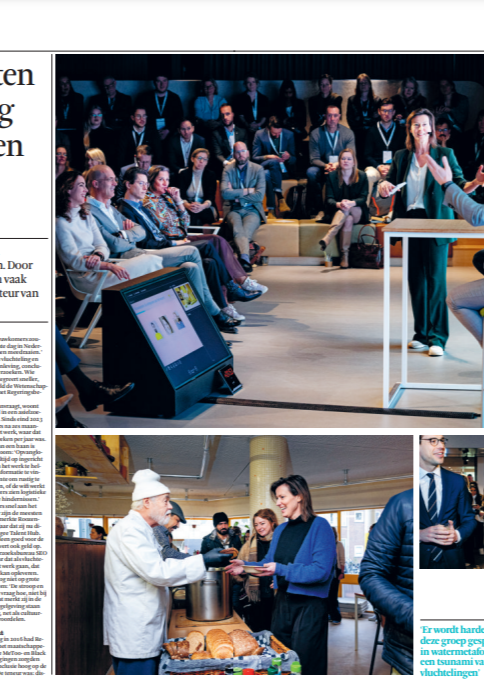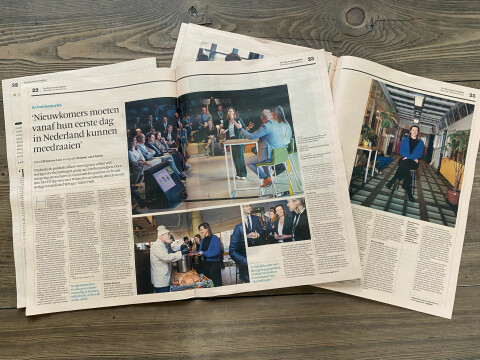
February 21st 2025
Newcomers must be able to participate from their first day in the Netherlands
- About business cases, SROI en MVO
- status holders
- asylum seekers
- recruitment
- labor market
Despite the political aversion to migration, many employers are eager to help refugees find a job. Due to cumbersome procedures and prejudices, things often go wrong. FD journalist Elfanie toe Laer accompanied Wilma Roozenboom, director of Refugee Talent Hub. Below you can read a shortened version of the article from the FD of 15 February.
"It's actually a no-brainer," says Wilma Roozenboom during the short walk from Schiphol station to the Microsoft Netherlands headquarters. The director of Refugee Talent Hub will repeat this sentence many times today. Refugee Talent Hub is a foundation that brings employers and refugees together. "Of the status holders who received a residence permit in 2014, 45% had a full-time job seven years later. Hence the no-brainer. Some employers are already investing in this group, but cold feet and strict rules mean that most of them are looking for other solutions to their staff shortage."
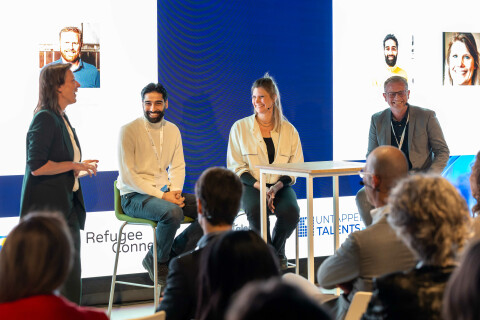
"What I want is simple," says Roozenboom. "Newcomers should be able to participate from their first day in the Netherlands." That is good for the refugee and good for society, various studies conclude. Those who have a job integrate faster, for example, the Scientific Council for Government Policy wrote back in 2015.
"People who apply for asylum here often live in an asylum seekers' centre (azc) for a long time . Since the end of 2023, asylum seekers have been allowed to work full-time after six months, whereas previously this was 24 weeks a year. But finding a job is difficult. Reception centres are not always set up to help this group find work. There is little information available, there is no space to apply for jobs in peace, or the Wi-Fi works poorly. And employers see logistical and administrative obstacles."
"Most people agree that newcomers need to get to work quickly," Roozenboom has noticed in the seven years that she has been director of Refugee Talent Hub. "A job is not only good for integration, it also generates money. Economic research agency SEO calculated last year that if refugees get to work quickly, the state can earn billions. However, this is not yet happening on a large scale. The trouble and the fuss are in the question of how, not in why or what." She notices this in practice: laws and regulations (such as work permits for asylum seekers) stand in the way of ambitions, as do cultural differences and prejudices .
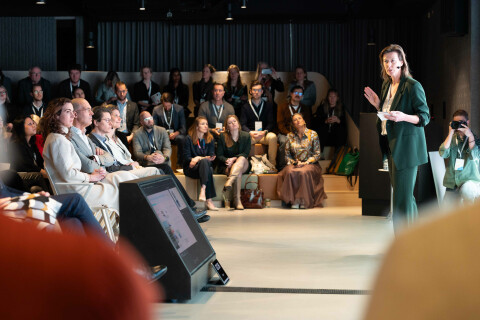
"The social conversation is harder," says Roozenboom. "Apart from policy intentions, that is in how this group is spoken about. In water metaphors: a tsunami of refugees. Think of Henk van Houtum's call to avoid dehumanizing imagery in words, images and maps. "That negative frame gets stuck between the ears, of employers and the newcomers themselves."
Plans to restrict migration also cause unrest and uncertainty. "Even people who have been naturalized fear that they will have to leave." She calls the long time that status holders have to wait in asylum centers "mentally killing." "Refugees become wobbly from it and employers doubt: should I invest in this employee if he or she might have to leave again?"
Austerity
During the meeting at Microsoft Netherlands, State Secretary Nobel is in the front row. "There are 400,000 vacancies and 300,000 newcomers living here. It's a no-brainer: we can use them!"
In row two sits an employee of a transport company, who also wants to recruit more refugees. "It would be so nice if that language requirement was less strict, then we would have a lot less vacancies," she whispers. Next to her, an employee of Vluchtelingenwerk snorts angrily when Nobel speaks.
When Maarten van Panhuis, who works with his organization Refugee Connect to help asylum seekers find work, explains in detail which administrative hurdles hinder the path to work, Nobel nods enthusiastically. These are the tips he can use, he says. But when someone else asks whether asylum seekers could not find work more quickly, he backs down. "From a labor market perspective, I understand that you want that. But this is about migration." And that is the portfolio of his colleague, Minister Faber.
"There are 400,000 vacancies and 300,000 newcomers living here. It's a no-brainer: we can use them!"
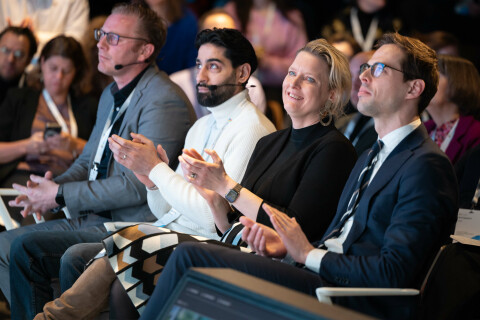
"Hello again, we'll switch to English now," says Roozenboom, nodding to two newcomers at the table who understand Dutch but don't speak it very well yet. "We have 25 minutes. You can take turns giving your 'tips and tops'. Who starts?"
As he eats his sandwich, Nobel listens attentively. In the corner of the room, a civil servant from his ministry writes along enthusiastically. Two newcomers talk about how often they have been rejected, despite their ambition and diplomas. "I don't know why," says Bilal, an engineer who, to his delight, found a starter job at caterer Vermaat. IT specialist Tefvik, next to him, also struggled with prejudice and red tape for a long time. "But I'm a fighter, I persevere."
He hands the State Secretary a document: "I asked my friends what they encountered in their search for work in the Netherlands and wrote down their experiences for you." Nobel puts the letter in the inside pocket of his dark blue jacket and says: "Wow, good work."
This was a shortened version of the article in the FD. Want to read the entire article? Open the pdf below or view it online.
Read also
- Ria Yetsenga's opinion in the FD about the missed opportunities and inhibiting factors for employers
- Wilma's blog about the SEO research 'Broader Work Opportunities for Asylum Seekers'
